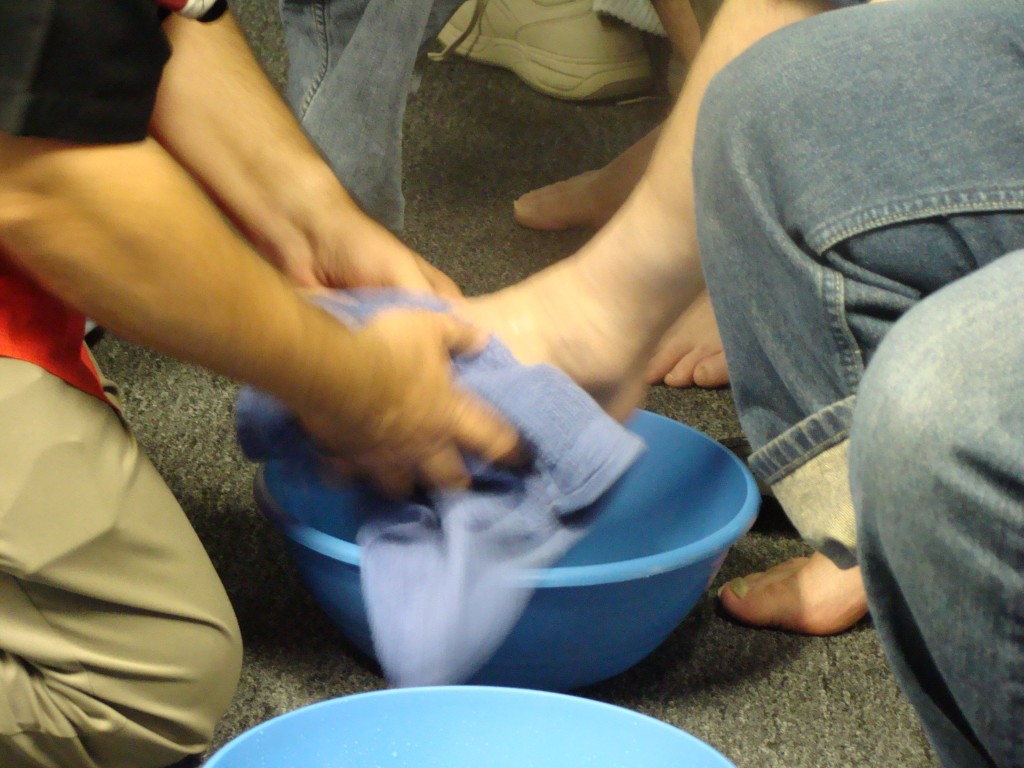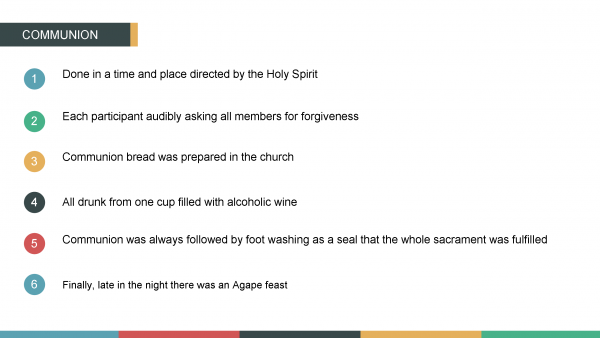The Practice of Corporate Holiness within the Communion Service of Bulgarian Pentecostals
by Dony K. Donev, D.Min.
Historical and Doctrinal Formation of Holiness Teachings and Praxis among Bulgarian Pentecostals (Research presentation prepared for the Society of Pentecostal Studies, Seattle, 2013 – Lakeland, 2015, thesis in partial fulfillment of the degree of D. Phil., Trinity College)
Pentecostal identity was corporately practiced and celebrated within the fellowship of believers through the partaking of Holy Communion. We have otherwise extensively described the Communion service among Bulgaria’s conservatives in Theology of the Persecuted Church (Part 1: Lord’s Supper https://cupandcross.com/theology-of-the-persecuted-church/). Therefore, here we offer just a brief overview of its main characteristics.
- It was done in a time and place directed by the Holy Spirit
- If some did not have water baptism they were taken to a close by river to be baptized while the rest of the church prayed
- Upon returning, if some did not have yet the baptism with the Holy Spirit, the church would pray until all were baptized
- It began with each participant audibly asking all members for forgiveness
- they would also audible respond with the words: WE FORGIVE YOU and may GOD also forgive you
- The communion bread was prepared on the spot baked by women whose names were also reveled in prayer
- All drank from one cup, which strangely for their strict practice of abstinence from alcohol, was filled with alcoholic wine
- Communion was served only to those who had the fullness of the Spirit, and had just requested and were given forgiveness
- The presbyter would quote Jude 20 to each partaking believer thus directing them to audibly speak in tongues before they could participate in communion
- Interpretation often followed to confirm the spiritual stand of the believer
- If there were any leftovers, the Communion elements were served again until all was used
- Communion was incomplete without foot washing as a seal that the whole sacrament was fulfilled.
Orthodoxy and Wesleyan Scriptural Understanding and Practice
“I sit down alone: only God is here; in His presence
I open and read this book to find the way to heaven”
– John Wesley
Our search for the theological and practical connection between Pentecostalism and Eastern Orthodoxy continues with yet another publication by St. Vladimir’s Press titled, Orthodox and Wesleyan Scriptural Understanding and Practice. The book represents an ongoing dialogue between the Orthodox and Wesleyan confessions and it emphasizes how theologians from both sides are attempting to discover commonalities in theology and praxis. To come together, not so much as theologians and thinkers, but as practical doers motivated by the proper interpretation of Scripture. As observed from the title, as well as through the text, these similarities are not necessarily in theological convictions, but in the proceeding Biblical approach toward interpretation of Scripture.
Orthodox and Wesleyan Scriptural Understanding and Practice is a compilation of essays from the Second Consultation on Orthodox and Wesleyan Spirituality under the editorship in 2000 of S.T. Kimbrough, Jr., who contributed the chapter on Charles Wesley’s’ Lyrical Commentary on the Holy Scriptures. I must issue the caution that the book is not an easy read. But it is by no means a book to be easily passed by Pentecostal scholars searching for the Biblical roots of Pentecostalism within the Eastern Orthodoxy.
The book begins with an interesting observation of the exegesis of the Cappadocian Fathers by John A. McGuckin, and continues with an article on the spiritual cognition of my personal favorite, Simeon the New Theologian by Theodore Stylianopoulos. Although the discussion on Gregory the Theologian, Basil of Caesarea and Gregory of Nyssa was thoughtful and presented in an interesting manner, the essay on St. Simeon struck me as well structured, but somewhat shallow.
An interesting approach was taken in Tamara Grdzelidze’s essay where she presented an orthodox perspective of the Wesleyan position on authority of scriptural interpretation. The essay had a very strong exposition in regard to the Wesleyan understanding of the importance of Scripture in Christian living. The latter part, which dealt with the influence of tradition, however was not investigated to its full capacity, which left the text (perhaps on purpose) open to multiple interpretations. Nevertheless, this issue was resolved later in the book by Ted Campbell that dealt with the subject from the Wesleyan perspective.
A central theme throughout the book was the comparison of prayers and song lyrics from both camps. Although I am no musical expert, I must agree with the authors when they say that theology in music has played an important role in both Orthodox and Wesleyan traditions. Music continues to be important in the everyday spiritual experience of the Pentecostal believer. This rather practical approach seemed to be the heart of the discussion where both sides could agree.
Finally, the role of the Holy Spirit is viewed as central for the reading, understanding and practicing of Scripture in both the Orthodox and Wesleyan traditions. For the Pentecostal reader, it may be easy to accept this presumption as similar to the Pentecostal experience, yet the book describes it in terms which will be somewhat foreign to many Pentecostals. Similarities between these interpretations of Scripture may be self-explanatory for the western Pentecostal reader. But due to the ever-present tension between Orthodox and Protestant denominations, those in an Eastern European context may disregard these similarities. But even if the Pentecostal scholar gathers nothing else from this book, they must recognize that the time has come for a formal Orthodox-Pentecostal dialogue, like the one which the World Council of Churches has been trying to put together since 1991.
The Practice of Corporate Holiness within the Communion Service of Bulgarian Pentecostals
by Dony K. Donev, D.Min.
Historical and Doctrinal Formation of Holiness Teachings and Praxis among Bulgarian Pentecostals (Research presentation prepared for the Society of Pentecostal Studies, Seattle, 2013 – Lakeland, 2015, thesis in partial fulfillment of the degree of D. Phil., Trinity College)
Pentecostal identity was corporately practiced and celebrated within the fellowship of believers through the partaking of Holy Communion. We have otherwise extensively described the Communion service among Bulgaria’s conservatives in Theology of the Persecuted Church (Part 1: Lord’s Supper https://cupandcross.com/theology-of-the-persecuted-church/). Therefore, here we offer just a brief overview of its main characteristics.
- It was done in a time and place directed by the Holy Spirit
- If some did not have water baptism they were taken to a close by river to be baptized while the rest of the church prayed
- Upon returning, if some did not have yet the baptism with the Holy Spirit, the church would pray until all were baptized
- It began with each participant audibly asking all members for forgiveness
- they would also audible respond with the words: WE FORGIVE YOU and may GOD also forgive you
- The communion bread was prepared on the spot baked by women whose names were also reveled in prayer
- All drank from one cup, which strangely for their strict practice of abstinence from alcohol, was filled with alcoholic wine
- Communion was served only to those who had the fullness of the Spirit, and had just requested and were given forgiveness
- The presbyter would quote Jude 20 to each partaking believer thus directing them to audibly speak in tongues before they could participate in communion
- Interpretation often followed to confirm the spiritual stand of the believer
- If there were any leftovers, the Communion elements were served again until all was used
- Communion was incomplete without foot washing as a seal that the whole sacrament was fulfilled.
Practice and Politics
By Kathryn Donev, M.S.
Most of Bulgarian protestant believers pray (88%) and read the Bible (77%) on a daily basis. Over half (59%) have read the whole Bible at least once and own more than 50 Christian books. Only a third fast more than once a week. The majority recognize the use of alcohol as sin (60%) and only a tenth have ever tried drugs. Thus, Bulgarian evangelicals are more traditional than contemporary in conviction, more practical than theoretical in teaching and more conservative than liberal in practice.
A certain level of negativism regarding politics and political order is inherited among Bulgarian evangelicals from the times of the Communist Regime. This feeling may be represented in the broader Bulgarian context by the fact that 80% agree that the average Bulgarian has lost faith in general. The church is not a political organization for most Bulgarian evangelicals (62%) and 57% claim it is not Biblical for a Christian to be a politician. Perhaps, this is the reason why over half (53%) would not vote for the Bulgarian Christian Coalition as a political force formed to represent evangelicals in Bulgaria. The same attitude applies to the broader political scene, as almost half (42%) of Bulgarian evangelicals did not intend to vote in the 2006 Presidential Elections and 48% actually did not vote. However, a much larger number (79%) intend to vote for an evangelical candidate for president. Perhaps, this is the number which the Bulgarian Evangelical Coalition should take into consideration when modeling their future political platform to gain much needed support within the evangelical churches.
Such a political alternative has been much awaited as the majority of evangelicals (64%) feel there is no religious freedom in Bulgaria. As in many other areas of the Bulgarian reality, true religious tolerance is replaced by the monopoly of the Eastern Orthodox Church. Evangelicals have not been heard in the legalization of a number of issues like chaplaincy, capital punishment, euthanasia, abortion, organ donation and so forth. Perhaps, this is the reason why attempts to constitutionalize Eastern Orthodox monopoly are generally met with strong resistant from evangelical circles. This is why a large majority (80%) demand a new Bulgarian law of religion.









